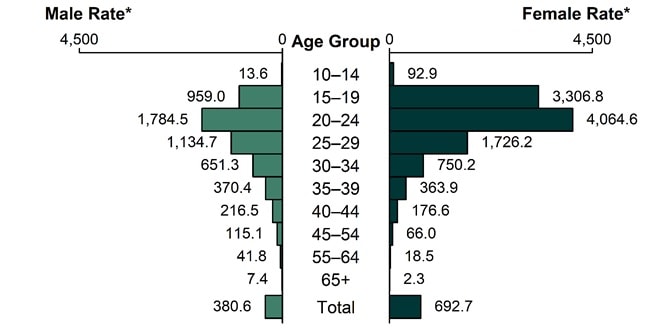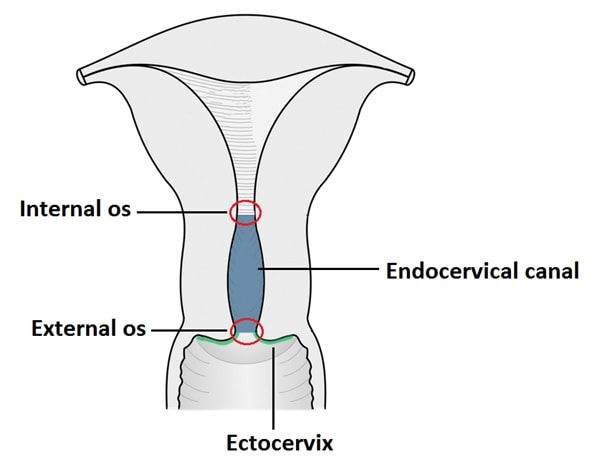Sexually active young people are at high risk of acquiring chlamydia for combination several reasons. This is very true for the women between 14-24 years old.
According to the CDC’s latest report on STD it has been observed
- 2/3rd of new chlamydia infections occur among youth aged 15-24 years.
- It is estimated that 1 in 20 sexually active young women aged 14-24 years has chlamydia.
Many cases are not been reported due to the asymptomatic nature of Chlamydia in women, so they don’t know and they do not seek testing.

The above graph clearly indicates the current year stats on Chlamydia
4,064.6 cases per 100,000 females : The highest age-specific rates of reported cases of chlamydia in 2018 were among those aged 15–19 years.
3306.8 cases per 100,000 females : The second highest age group (20–24 years) in females to have ranked for Chlamydia.
Also read: Chlamydia symptoms in male & women
Factors causing such a rise in Chlamydia rate in teen and younger women
Multiple factors causing this increase in Chlamydia rate. Through our research, we have gathered information to found out the reasons behind such an increase in Chlamydia rate., they are as follows
Reduced use of condom

- As per the study conducted by Dr.L.M. Niccholai of Yale University, only 59.9% of women and 56.4% of men aged 15–44 years used only a Some young people don’t use condoms consistently while, the rest +40% are vulnerable to STDs.
Moving from one Relationship to another

- Some adolescents may move from one monogamous relationship to the next more rapidly than the likely infectivity period of chlamydia (which is one to three weeks after sexual), thus increasing risk of transmission. So even though the relationship is ‘monogamous’ it isn’t that way in biological terms.
Teenage girls and young women with Cervical Ectopy.

- Some Teenage girls and young women may have cervical ectopy. Thus, by exposing columnar epithelium to a potential infectious inoculum. In simple terms it is when the soft cells (glandular cells) that line the inside of the cervical canal (also known as Endocervical canal) spread to the outer surface of your cervix (also known as Ectocervix). Cervical ectopy may increase the chances of chlamydial infection.
The higher prevalence of chlamydia among young people also may reflect multiple barriers to accessing STD prevention services, such as lack of transportation, cost, and perceived stigma.
Multiple sex partner
Multiple partner involves higher risk of contraction, it is not unusual for younger men & women to have multiple partners during this phase of life. It is with women it becomes a very risky factor as there are little to know signs of Chlamydia in women. So, depending on exact risk factors, some women may need more frequent screening.
Also see: Chlamydia symptoms pictures, chlamydia discharge
What can be down Chlamydia rate?
Well the answer is simpler than expected, do the opposite of the reason causing high rate of Chlamydia
- Use of Condoms: Use the condom every-time you have sex or observe abstinence from sex
- Be in a monogamous relationship: Get yourself tested for STD near you before having sex with your new partner
- Have a single partner (sexual partner): Multiple sexual partner increases the possibility of getting contracted by STDs
- Get yourself tested : It is recommended especially to the women between age group of 15-24 years to get tested at least once in six months.
Why should I get tested ?
Effects of Untreated Chlamydia
Failing to get tested for chlamydia which is already asymptomatic disease can lead to PID (pelvic inflammatory disease) in women. This can lead to loss of fertility and other complications in women
Chlamydia Treatment
Fortunately, chlamydia is curable, A single dose of Azithromycin or taking Doxycycline twice daily for 7 to 14 days are the most common treatments.
Affordable Chlamydia Diagnosis
The treatment can begin with timely diagnosis. The Chlamydia test cost less than $90, using this link will get additional $10 discount making $79 per test
References
Condom effectiveness for prevention of Chlamydia : L M Niccolai1,: click here
Recurring Chlamydia Infections Common in Teenage Girls | Yale
Chlamydia in women : medicine.yale.edu
Research Chlamydia and Cervical ectopy: https://srh.bmj.com/content/familyplanning/32/2/104.full.pdf


